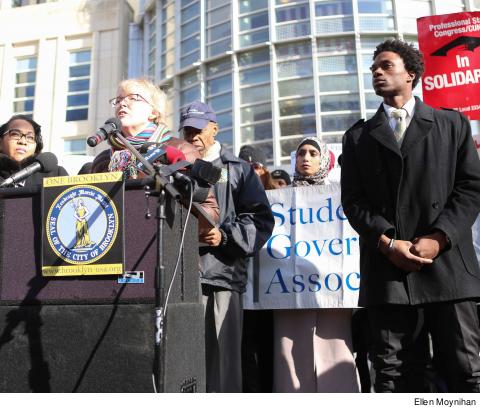A national issue hits CUNY
 |
President Donald Trump’s executive order barring travelers and refugees from entering the country inspired action among many Americans, including City Tech undergraduate Hercules Reid.
Reid, City Tech Student Government Association (SGA) president and University Student Senate’s (USS) vice chair for legislative affairs, heard about the case of Saira Rafiee, an Iranian student at the Graduate Center, the day after the order, which barred nationals from seven Muslim-majority countries, including Iran, from entering the United States. Rafiee was detained before boarding a New York-bound flight in the United Arab Emirates and forced to return to Iran.
GETTING STARTED
“At that point, I didn’t know what to do, because it was a federal situation and I’m just a city government president on a local level,” Reid told Clarion.
When faced with the challenge, Reid decided to make some calls. First, he spoke with CUNY Board of Trustees member Una Clarke, who suggested writing a letter to Chancellor James Milliken. Reid wrote the letter that day and sent it.
He later spoke with Brooklyn Borough President Eric Adams, who called a January 30 press conference, for which Reid began preparing an official statement with the help of Fernando Araujo, USS executive director.
Reid spoke at the press conference along with Adams and other CUNY students and activists, including PSC President Barbara Bowen. Reid also participated in efforts to help those affected by the ban, including emailing CUNY Citizenship Now! and working with lawyers at CUNY CLEAR (Creating Law Enforcement Accountability and Responsibility), a project of the CUNY School of Law.
On February 4, Reid traveled to Boston with City Tech SGA Vice President Amanda Marmol to greet Rafiee’s arrival following a Massachusetts district court’s temporary stay of the ban. Marmol said it was an “emotional feeling” not only seeing the CUNY student, but also “watching the families waiting anxiously outside of US Customs with us for their loved ones to come out of the door.”
Reid said the executive order could potentially impact about 120 CUNY students, adding that he knew of at least three who were immediately affected abroad.
“There was one, [Rafiee], from the Graduate Center, one from Kingsborough [Community College] and one from City College. Recently, the City College individual, [who is] Yemeni, returned safely. I have yet to get an update on the [KCC] student,” he said.
Reid also signed a letter that Daniel Dornbaum, Baruch College’s student government president, wrote, as Reid noted, to “make a stand against Donald Trump.” Thirteen other CUNY undergraduate leaders also added their names to the document urging Trump to withdraw the order.
Reid told Clarion that he took initiative despite being told to wait until there was “more information.”
“Most people were concerned that I didn’t have more information to actually help, but I didn’t let that deter me from knowing that I had a part to play,” he said.
Reid, more accustomed to dealing with local city issues such as tuition increases, stepped “out of his comfort zone” to tackle the federal issue.
“As someone new to politics in a sense, I felt overwhelmed at some of the junctures,” he said, adding that it was after the press conference that other students and officials began to realize “the power of action.”
As this paper went to press, Trump vowed to present a revised version of the ban.
GOING FORWARD
Reid said he would “definitely pick up that flag and fight again” if any CUNY student was wronged, but did not want to overwhelm himself.
“Not saying I wouldn’t do it, but it’s a commitment. I am committed to the students who elected me, but there are so many different fights right now. We’re fighting for tuition to not go up, we’re fighting for the MTA to give us a discount, we’re fighting for so many different things for the students,” Reid said.
Reid said he felt proud of the students at CUNY. Reid found it “meaningful” that Rafiee loved CUNY partially because of its students rallying to bring her home.
“For her to say, ‘I love what CUNY did for me’ is priceless,” he said.
“Hercules was already a lively and intellectually curious student activist, part of an exceptional student government this year,” said PSC President Barbara Bowen. “But when he heard about the detention of a CUNY student, he found his political voice. He was fearless. He refused to accept that a college student government leader was powerless to intervene in a national issue. And he did it by organizing other students and those with political power. When we arrived at the press conference in Brooklyn, we were met with a phalanx of national press; I counted more than 35 video cameras. But Hercules was unfazed. He delivered a passionate speech about students’ support for a fellow CUNY student, and then he was there at Logan Airport on the tense day when we did not yet know whether Saira would make it into the country. It will be a long time before I forget the text message he sent me about the power of students’ arms ready to enfold Saira and welcome her home.”

